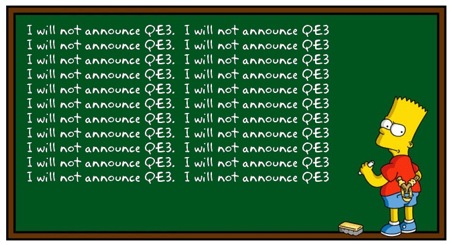I read an article by David Einhorn today that hilariously and seamlessly intertwined the Simpsons (the 20+season show with Homer, Marge, etc), jelly donuts, and...the
Federal Reserve. I'm a big fan of David Einhorn, notorious for being an outspoken investor (most recently for
his call on Green Mountain Coffee, which recently fell off a cliff) as well as
his comedic encounter with Punch Tavern which resulted in him being fined $11mm for insider trading. You may not agree with what he says, but he's very thoughtful when it comes to investing. Did I mention that he won the World Series of Poker, which he just did for
fun?
Don't underestimate his youthful looks!
The article, posted on the Huffington Post, talks about how the Fed is essentially feeding the market and economy jelly donuts, ie Quantitative Easing, 'QE'. The first jelly donut tastes pretty good, but after 12 or so you start feeling sick. Einhorn doesn't understand why the market wants QE3, which is equivalent of the 12th jelly donut, which no longer tastes good nor does it give us energy. Another thing the Fed is doing with its super low interest rates is distorting the behavior of the people in what on the surface seems like a good thing (spend more!) but instead messes with the economy in the longer term:
Consider my neighbors, Homer, Marge, and their three adult children, Bart, Lisa and Maggie. Homer has retired from the nuclear plant, and he and Marge live off savings and Homer's pension. Bart is in a bit of trouble with too much credit card debt and an underwater mortgage. Lisa has been putting away her salary and has enough for a downpayment on her first home. Maggie owns her own business and is ready to expand.

When interest rates are high, Homer and Marge park their savings in CDs or Money Market accounts and get a decent return. There is no incentive for them to take much risk with their money. Bart gets into trouble very quickly and defaults on his loans. Lisa decides she can't afford a mortgage until rates fall. And Maggie, who's been helping out Bart with some of his expenses, believes that she'd make money if she grew the business, but possibly not enough to service the debt she'd be undertaking.
When interest rates are low, everything changes. Homer and Marge are getting only a little interest on their savings, and are struggling to live off Homer's pension. They need to rethink their finances. Bart can manage to keep up the minimum payments on his credit cards and stay in his house. Lisa can get a cheap mortgage, and Maggie doesn't need to make such optimistic assumptions in order to expand her business.
Everyone agrees that low interest rates are a good way to stimulate a stalled economy. The Fed takes this logic a step further. It believes that if low interest rates are good, then zero-interest rates must be even better. As a brief emergency measure, such drastic behavior is reasonable and can even be necessary. In 2008, Chairman Bernanke had near unanimous support for his decision to drop rates to near zero. At the peak of the crisis, it made sense. But that was four long years and many jelly donuts ago. In the 2012 economy, a zero rate policy not only adds no benefit, it's actually harmful. Just ask the Simpsons.
Source: The Huffington Post, link to the article
By the way, isn't that such a funny picture?
Most of the things Einhorn writes about has been talked about a lot and is in fact quite well known, but the way he writes about it, I think even a 6th grader could understand it which is an achievement in itself. If you read on, he goes on to argue that it's time to adjust the interest rates so that the Baby Boomers can retire (Homer and Marge), the people who are teetering on the edge of defaulting on their mortgage/loan will actually default or become delinquent (Bart), people who want to invest/grow a business can do so with proper incentives (Lisa/Maggie), and the economy won't be flooded with easy money that the wealthy can speculate with (Mr. Burns):
It's time for Chairman Bernanke to begin restoring the markets to their natural balance. Provide the proper incentives for Lisa and Maggie to start investing in the economy again. Let Bart possibly default on his unsustainable debts so that the banks can start getting those loans off the books. Stop giving Mr. Burns access to free money that he can use to speculate in bonds and commodities at the expense of the middle class. As for Homer and Marge, quit trying to fool them into thinking they're wealthy and instead give them the opportunity to retire with some financial security. With a little extra money in their pocket, Marge can go back to the beauty parlor, and Homer can support the beer and bowling economy.
In many ways he's right, it may hurt more in the short run, but it's time to fix up economic incentives for people before the economy becomes so distorted that another bubble becomes "too big to fail". The most obvious one is the asset that Einhorn doesn't want to invest in, but has no choice with what he believes the Fed is doing, gold:
As a result, I will keep a substantial long exposure to gold -- which serves as a Jelly Donut antidote for my portfolio. While I'd love for our leaders to adopt sensible policies that would reduce the tail risks so that I could sell our gold, one nice thing about gold is that it doesn't even have quarterly conference calls.





